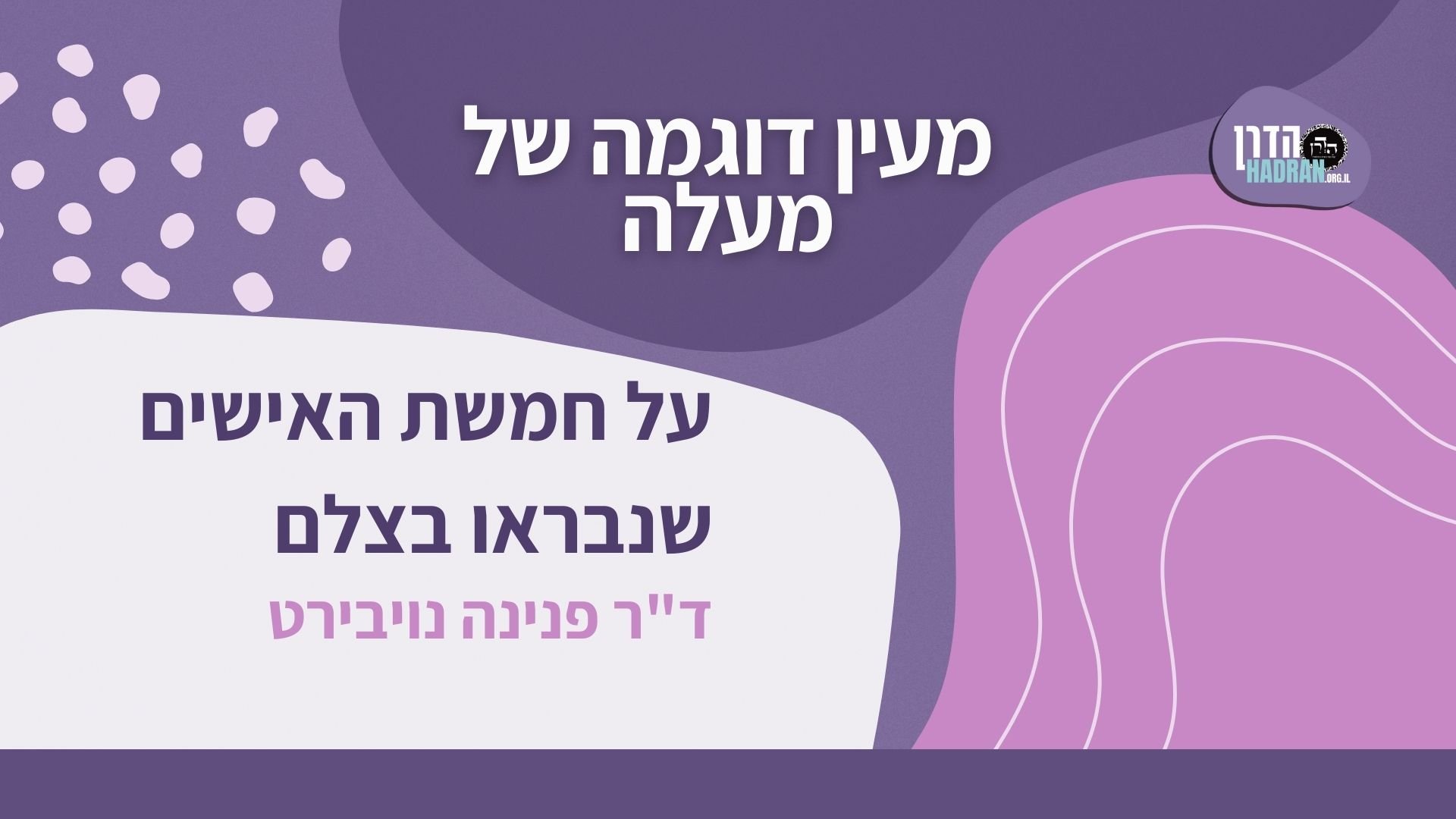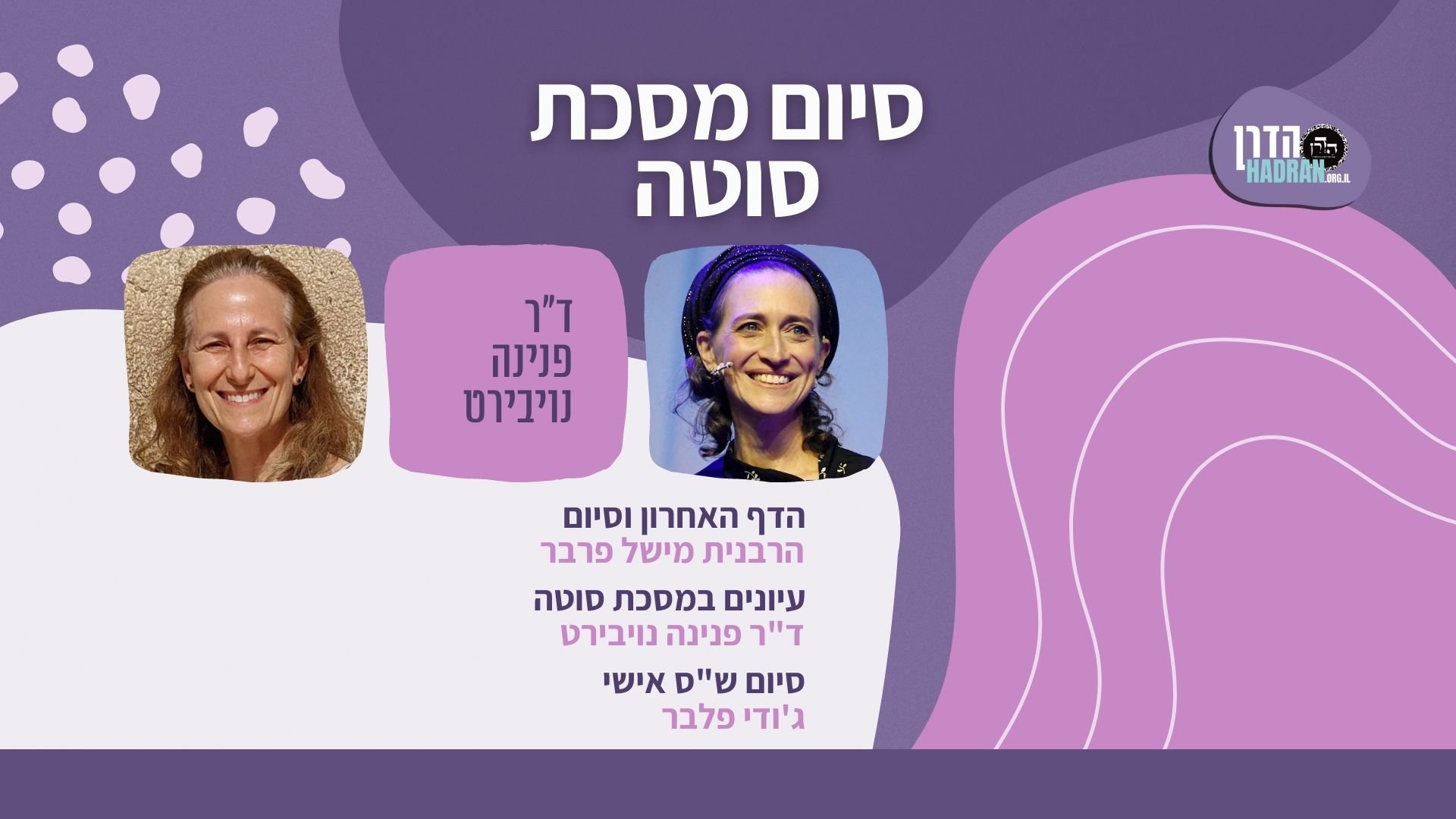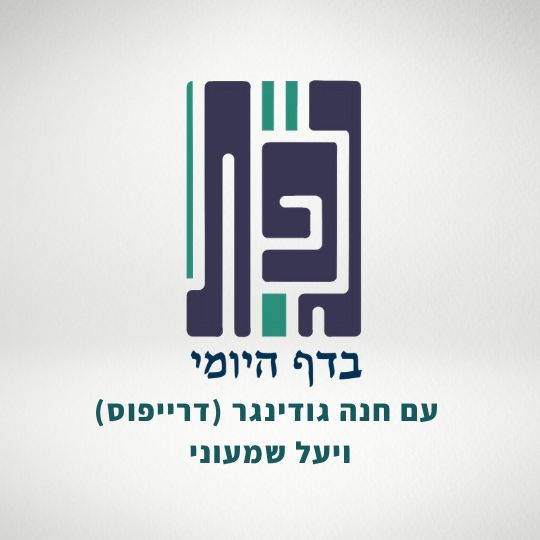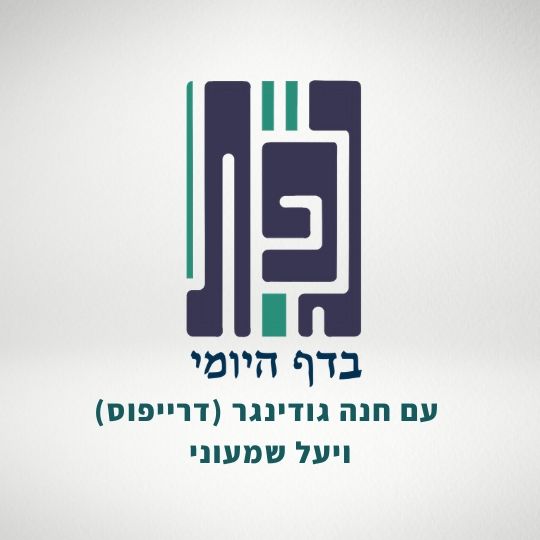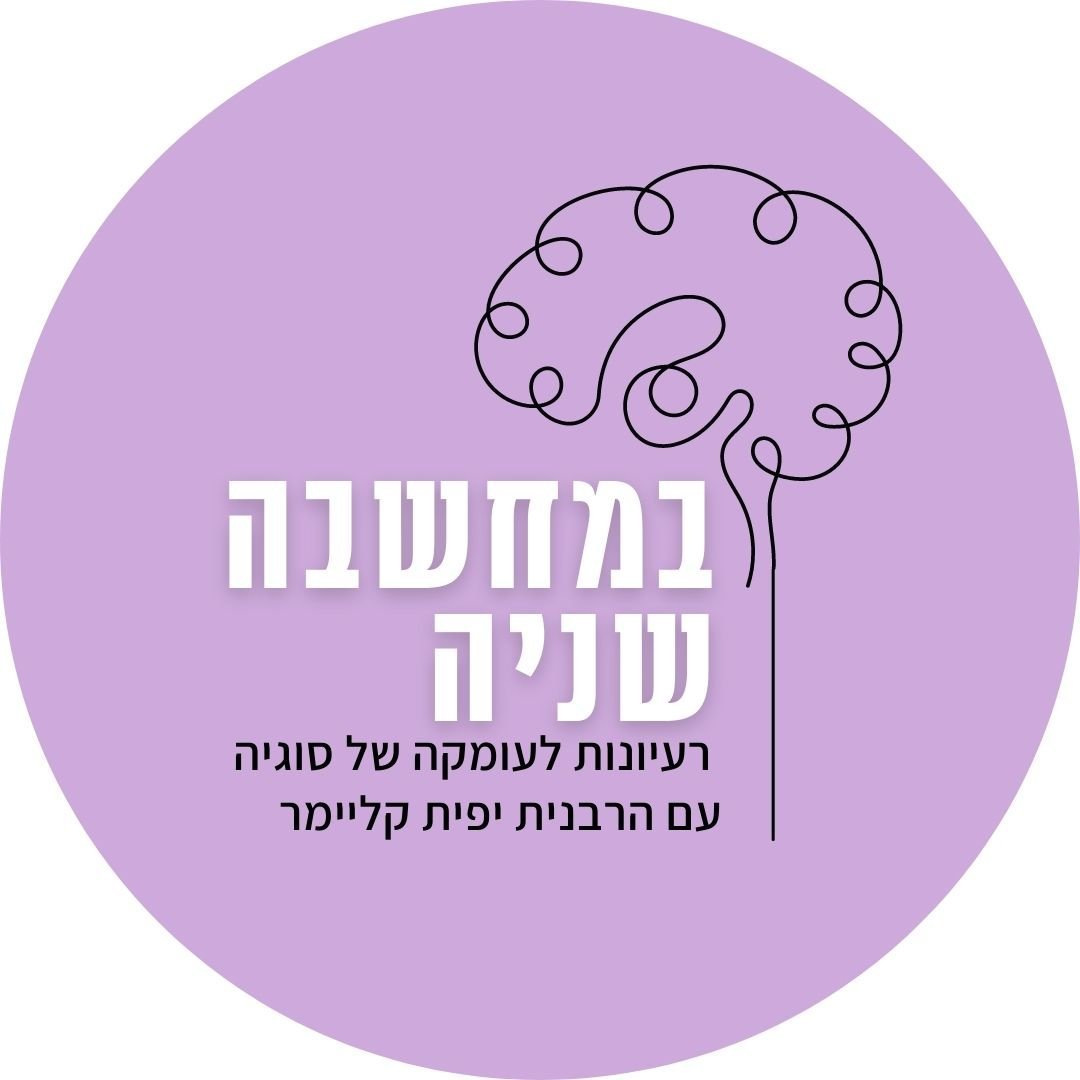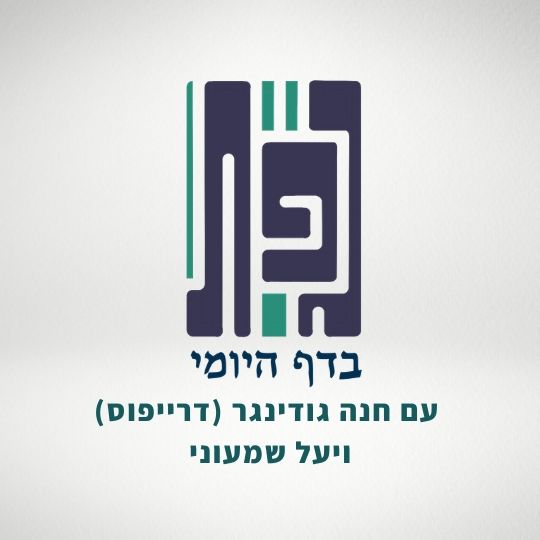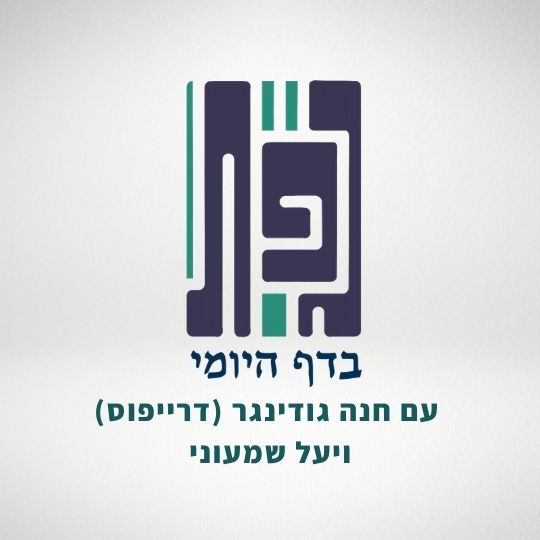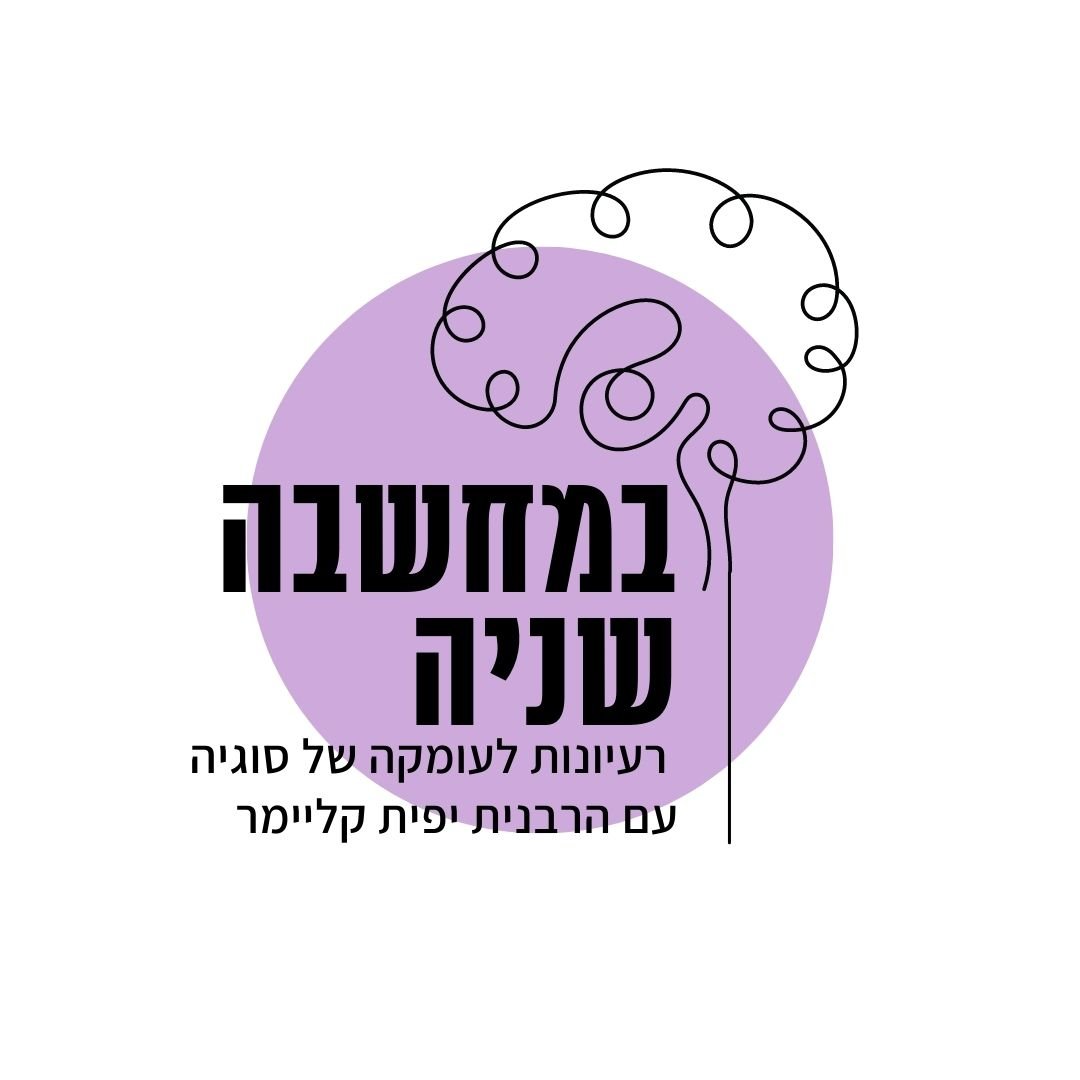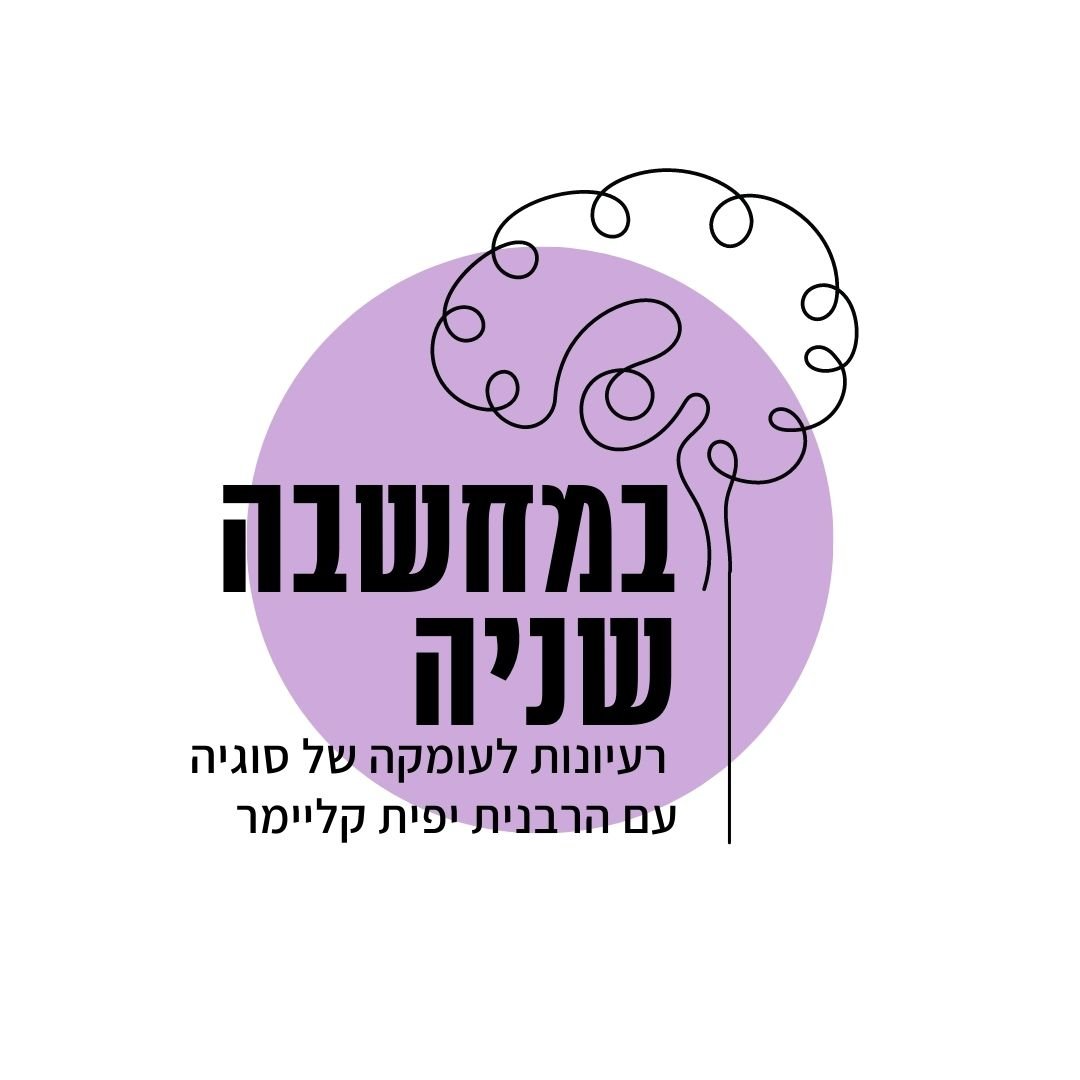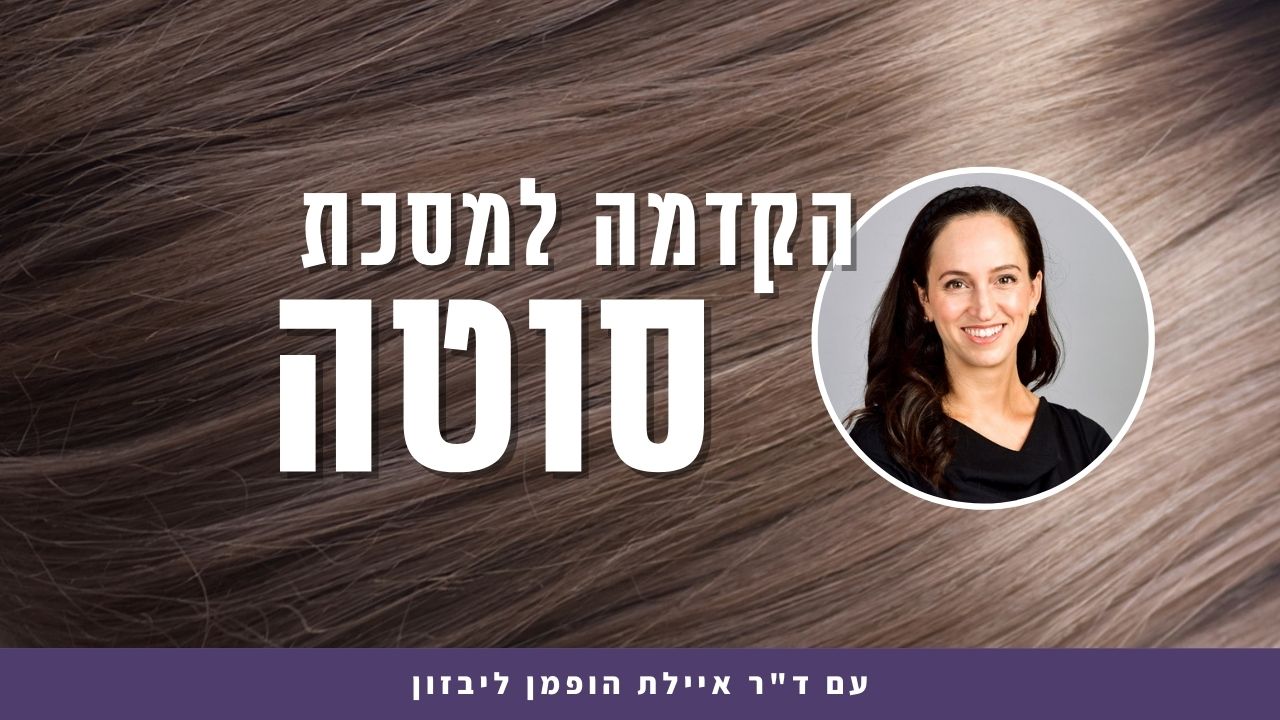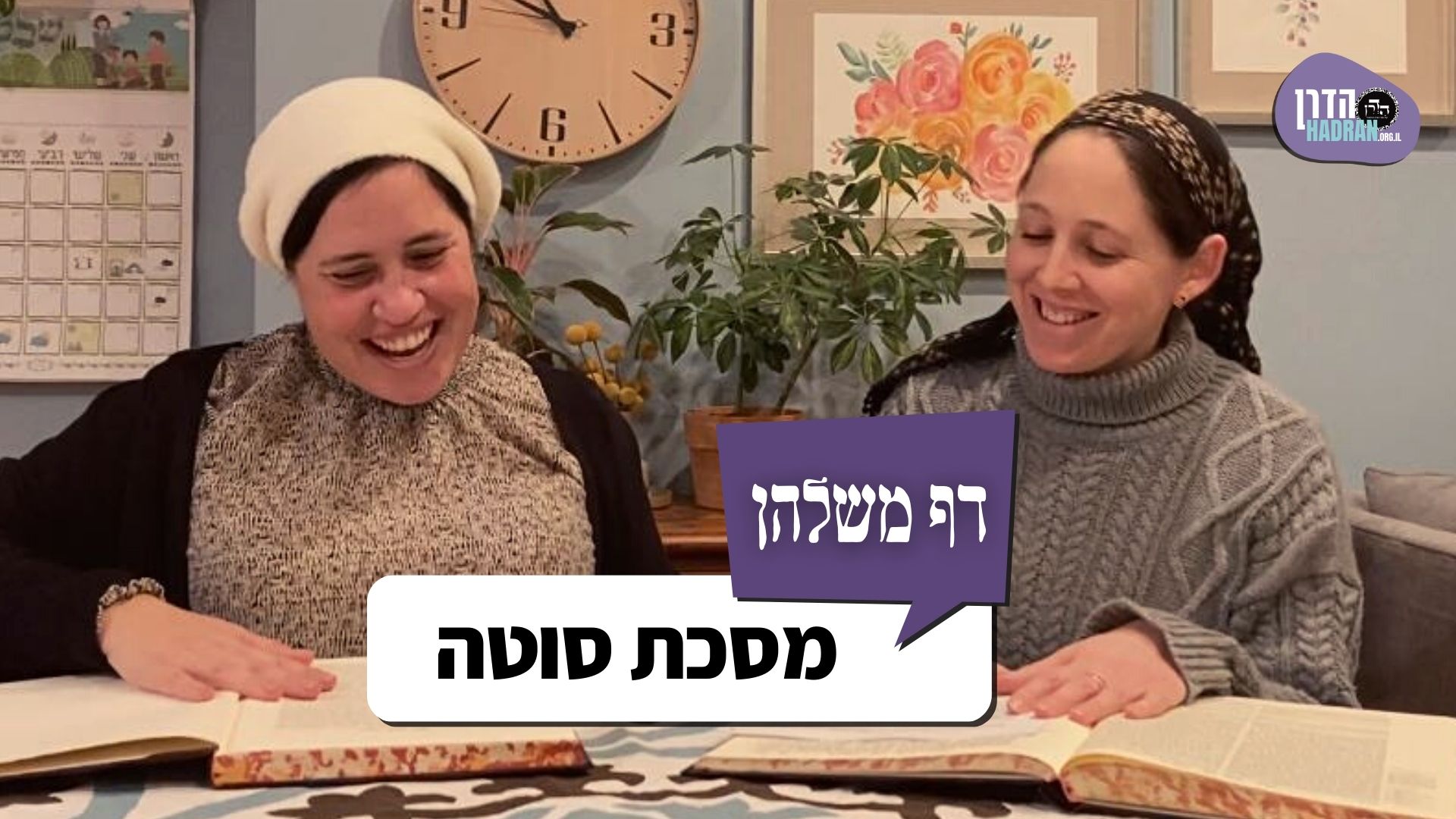סוטה מא
״וַיִּקְרָא בוֹ לִפְנֵי הָרְחוֹב אֲשֶׁר לִפְנֵי שַׁעַר הַמַּיִם״! אָמַר רַב חִסְדָּא: בְּעֶזְרַת נָשִׁים.
“And he read there before the broad place that was before the Gate of the Water” (Nehemiah 8:3). According to this opinion, the High Priest would read from the Torah in the Temple courtyard. Rav Ḥisda says in response: The baraita also means that the reading takes place in the women’s courtyard.
וְקוֹרֵא ״אַחֲרֵי מוֹת״ וְ״אַךְ בֶּעָשׂוֹר״. ורְמִינְהִי: מְדַלְּגִין בְּנָבִיא וְאֵין מְדַלְּגִין בַּתּוֹרָה!
§ It is taught in the mishna that the High Priest receives the Torah scroll and reads the Torah portion beginning with the verse: “After the death” (Leviticus 16:1), and the portion beginning with the verse: “But on the tenth” (Leviticus 23:26). Since these two portions are not adjacent to each other, the High Priest skips the section between the two portions. The Gemara raises a contradiction from a mishna (Megilla 24a): One may skip sections when reading the haftara in the Prophets, but one may not skip sections when reading in the Torah.
אָמַר אַבָּיֵי, לָא קַשְׁיָא: כָּאן — בִּכְדֵי שֶׁיִּפְסוֹק הַתּוּרְגְּמָן, כָּאן — בִּכְדֵי שֶׁלֹּא יִפְסוֹק הַתּוּרְגְּמָן.
Abaye said: This is not difficult. There, in the mishna in tractate Megilla that teaches that one may not skip, the intention is that one should not skip if the sections are so far apart from one another that the delay caused by doing so will be of such length that the translator who recites the Aramaic translation will conclude his translation before the next section is reached. However, in the case of the mishna here, it is permitted to skip verses because the two passages are in close proximity to one another. The delay caused is of such short length that the translator will still not conclude his translation.
וְהָא עֲלַהּ קָתָנֵי: מְדַלְּגִין בְּנָבִיא וְאֵין מְדַלְּגִין בַּתּוֹרָה. וְעַד כַּמָּה מְדַלְּגִין — עַד כְּדֵי שֶׁלֹּא יִפְסוֹק הַתּוּרְגְּמָן. מִכְלָל דְּבַתּוֹרָה כְּלָל כְּלָל לָא!
The Gemara challenges this resolution: But isn’t it taught about this mishna in a baraita: One may skip sections when reading in the Prophets, but one may not skip sections when reading in the Torah. And how much may one skip from one passage to another in the Prophets? One may skip when the section skipped is of such short length that when the furling of the scroll is completed the translator will still not have concluded his translation. By inference, when reading in the Torah one may not skip at all.
אֶלָּא אָמַר אַבָּיֵי, לָא קַשְׁיָא: כָּאן בְּעִנְיָן אֶחָד, כָּאן בִּשְׁנֵי עִנְיָינִין.
Rather, Abaye said another explanation: This is not difficult. In the mishna here, it is permitted to skip because both passages pertain to a single topic. There, in the mishna in tractate Megilla that teaches that one may not skip, the halakha is referring to a case where the passages pertain to two different topics.
וְהָתַנְיָא: מְדַלְּגִין בַּתּוֹרָה בְּעִנְיָן אֶחָד, וּבְנָבִיא בִּשְׁנֵי עִנְיָינִין. וְכָאן וְכָאן בִּכְדֵי שֶׁלֹּא יִפְסוֹק הַתּוּרְגְּמָן.
And this is as it is taught in a baraita: One may skip sections when reading in the Torah when both sections pertain to a single topic, and in the Prophets one may skip from one section to another even if they pertain to two different topics. And both here and there, one may skip only when the section skipped is of such short length that when the furling of the scroll is completed the translator will still not have concluded his translation.
וְאֵין מְדַלְּגִין מִנָּבִיא לְנָבִיא. וּבְנָבִיא שֶׁל שְׁנֵים עָשָׂר מְדַלְּגִין, וּבִלְבַד שֶׁלֹּא יְדַלֵּג מִסּוֹף הַסֵּפֶר לִתְחִילָּתוֹ.
And one may not skip from one book of the Prophets to another book of the Prophets, even if both pertain to the same topic. But among the books of the Twelve Prophets one may skip, provided that one does not skip from the end of the book to its beginning. Rather, if one wishes to read from several of the Twelve Prophets, he must read the passages in the order that they are written.
וְגוֹלֵל אֶת הַתּוֹרָה וּמַנִּיחָהּ בְּחֵיקוֹ כּוּ׳. וְכׇל כָּךְ לָמָּה — שֶׁלֹּא לְהוֹצִיא לַעַז עַל סֵפֶר תּוֹרָה.
§ It is taught in the mishna: And he furls the Torah scroll, and places it on his bosom, and says: More than what I have read before you is written here. The Gemara comments: And why must he say all of this? It is so as to not cast aspersions on the Torah scroll, because people might think the portion that he read by heart is not written there.
״וּבֶעָשׂוֹר שֶׁבְּחוֹמֶשׁ הַפְּקוּדִים קוֹרֵא עַל פֶּה״. וְלִיכְרְכֵיהּ לְסֵפֶר וְלִיקְרֵי! אָמַר רַב הוּנָא בַּר יְהוּדָה אָמַר רַב שֵׁשֶׁת: לְפִי שֶׁאֵין גּוֹלְלִין סֵפֶר תּוֹרָה בַּצִּבּוּר.
It is stated in the mishna that he reads by heart the portion beginning with: “And on the tenth,” from the book of Numbers (29:7–11). The Gemara asks: But let him furl the Torah scroll to that portion and read it from the text. Rav Huna bar Yehuda says that Rav Sheshet says: This is not done because one may not furl a Torah scroll in public, out of respect for the congregation.
וְלַיְתֵי סֵפֶר תּוֹרָה אַחֲרִינָא וְלִיקְרֵי! רַב הוּנָא בַּר יְהוּדָה אָמַר: מִשּׁוּם פְּגָמוֹ שֶׁל רִאשׁוֹן. רַבִּי שִׁמְעוֹן בֶּן לָקִישׁ אָמַר: לְפִי שֶׁאֵין מְבָרְכִין בְּרָכָה שֶׁאֵינָהּ צְרִיכָה.
The Gemara asks: But why not let them bring another Torah scroll that has previously been furled to that portion and read from it? Rav Huna bar Yehuda says: People might then mistakenly think that the second scroll was brought due to a flaw that was found in the first scroll. Rabbi Shimon ben Lakish says: Another scroll is not brought because then the High Priest will need to recite an additional blessing over it, and one may not recite a blessing that is unnecessary.
וּמִי חָיְישִׁינַן לִפְגָמָא? וְהָאָמַר רַבִּי יִצְחָק נַפָּחָא: רֹאשׁ חֹדֶשׁ טֵבֵת שֶׁחָל לִהְיוֹת בְּשַׁבָּת מֵבִיא שָׁלֹשׁ תּוֹרוֹת וְקוֹרֵא: אַחַת מֵעִנְיָינוֹ שֶׁל יוֹם, וְאַחַת שֶׁל רֹאשׁ חֹדֶשׁ, וְאַחַת בְּשֶׁל חֲנוּכָּה!
The Gemara questions Rav Huna bar Yehuda’s answer: But are we really concerned that people will think that there is a flaw in the first scroll? But didn’t Rabbi Yitzḥak Nappaḥa say: When the New Moon of Tevet, which always occurs during Hanukkah, occurs on Shabbat, one brings three Torah scrolls. And he reads from one scroll the topic of the day, i.e., the weekly portion; and from one scroll the portion of the New Moon; and from one scroll the portion of Hanukkah. It is apparent from the statement of Rabbi Yitzḥak Nappaḥa that many Torah scrolls may be used, and there is no concern that people will mistakenly think that one or more has a flaw.
תְּלָתָא גַּבְרֵי בִּתְלָתָא סִיפְרֵי — לֵיכָּא פְּגָמָא, חַד גַּבְרָא בִּתְרֵי סִיפְרֵי — אִיכָּא פְּגָמָא.
The Gemara answers: When three men read from three scrolls, there is no concern that people will think that one of the scrolls has a flaw, since people assume that it is befitting for each individual to read from his own scroll. However, when one man reads from two different Torah scrolls, there is a concern that people will think that the first scroll has a flaw, and they will not realize that this was done only to avoid forcing the community to wait while the scroll is furled.
וּמְבָרֵךְ עָלֶיהָ שְׁמֹנֶה בְּרָכוֹת כּוּ׳. תָּנוּ רַבָּנַן: [מְבָרְכִין] עַל הַתּוֹרָה כְּדֶרֶךְ שֶׁמְּבָרְכִין בְּבֵית הַכְּנֶסֶת, וְעַל הָעֲבוֹדָה, וְעַל הַהוֹדָאָה, וְעַל מְחִילַת עָוֹן — כְּתִיקְנָן. עַל הַמִּקְדָּשׁ בִּפְנֵי עַצְמוֹ, וְעַל הַכֹּהֲנִים בִּפְנֵי עַצְמָן, עַל יִשְׂרָאֵל בִּפְנֵי עַצְמָן, וְעַל יְרוּשָׁלַיִם בִּפְנֵי עַצְמָהּ.
§ It is taught in the mishna: And after the reading the High Priest recites eight blessings. The Sages taught that these are the eight blessings: He recites a blessing concerning the Torah in the usual way one recites a blessing in the synagogue, and he recites the three blessings concerning the Temple service, and concerning thanksgiving, and concerning forgiveness for iniquity, and all are recited in accordance with their established forms in the Amida prayer. He recites the blessing concerning the Temple in and of itself, the blessing concerning the priests in and of itself, the blessing concerning the Jewish people in and of itself, and the blessing concerning Jerusalem in and of itself.
וְהַשְּׁאָר תְּפִלָּה. תָּנוּ רַבָּנַן: הַשְּׁאָר תְּפִלָּה תְּחִנָּה רִנָּה וּבַקָּשָׁה שֶׁעַמְּךָ יִשְׂרָאֵל צְרִיכִין לִיוּוֹשֵׁעַ. וְחוֹתֵם בְּשׁוֹמֵעַ תְּפִלָּה. מִכָּאן וְאֵילָךְ — כׇּל אֶחָד וְאֶחָד מֵבִיא סֵפֶר תּוֹרָה מִתּוֹךְ בֵּיתוֹ וְקוֹרֵא בּוֹ. וְכׇל כָּךְ לָמָּה — כְּדֵי לְהַרְאוֹת חָזוּתוֹ לְרַבִּים.
With regard to the end of the mishna, which states: And the rest of the prayer, the Sages taught: The text of the rest of the prayer is as follows: A supplication, a song, and a request that Your people, Israel, are in need of redemption. And he concludes the blessing with: Blessed are You, Lord, the One Who hears prayer. From this point forward, each and every person present brings a Torah scroll from his home and reads from it. And why do all these people bring their personal Torah scrolls? Everyone brings his own in order to show its beautiful appearance to the public, as a way of showing fondness for the mitzva.
מַתְנִי׳ פָּרָשַׁת הַמֶּלֶךְ כֵּיצַד? מוֹצָאֵי יוֹם טוֹב הָרִאשׁוֹן שֶׁל חַג, בַּשְּׁמִינִי בְּמוֹצָאֵי שְׁבִיעִית, עוֹשִׂין לוֹ בִּימָה שֶׁל עֵץ בָּעֲזָרָה וְהוּא יוֹשֵׁב עָלֶיהָ, שֶׁנֶּאֱמַר: ״מִקֵּץ שֶׁבַע שָׁנִים בְּמֹעֵד וְגוֹ׳״.
MISHNA: How is the portion of the Torah that is read by the king recited at the assembly, when all the Jewish people would assemble? At the conclusion of the first day of the festival of Sukkot, on the eighth, after the conclusion of the Sabbatical Year, they make a wooden platform for the king in the Temple courtyard, and he sits on it, as it is stated: “At the end of every seven years, in the Festival of the Sabbatical Year” (Deuteronomy 31:10).
חַזַּן הַכְּנֶסֶת נוֹטֵל סֵפֶר תּוֹרָה וְנוֹתְנָהּ לְרֹאשׁ הַכְּנֶסֶת, וְרֹאשׁ הַכְּנֶסֶת נוֹתְנָהּ לַסְּגָן, וְהַסְּגָן נוֹתְנָהּ לְכֹהֵן גָּדוֹל, וְכֹהֵן גָּדוֹל נוֹתְנָהּ לַמֶּלֶךְ. וְהַמֶּלֶךְ עוֹמֵד וּמְקַבֵּל, וְקוֹרֵא יוֹשֵׁב.
The synagogue attendant takes a Torah scroll and gives it to the head of the synagogue that stands on the Temple Mount. And the head of the synagogue gives it to the deputy High Priest, and the deputy High Priest gives it to the High Priest, and the High priest gives it to the king. And the king stands, and receives the Torah scroll, and reads from it while sitting.
אַגְרִיפַּס הַמֶּלֶךְ עָמַד וְקִבֵּל וְקָרָא עוֹמֵד, וְשִׁבְּחוּהוּ חֲכָמִים. וּכְשֶׁהִגִּיעַ לְ״לֹא תוּכַל לָתֵת עָלֶיךָ אִישׁ נׇכְרִי״, זָלְגוּ עֵינָיו דְּמָעוֹת. אָמְרוּ לוֹ: אַל תִּתְיָרֵא אַגְרִיפַּס, אָחִינוּ אָתָּה, אָחִינוּ אָתָּה!
King Agrippa arose, and received the Torah scroll, and read from it while standing, and the Sages praised him for this. And when Agrippa arrived at the verse in the portion read by the king that states: “You may not appoint a foreigner over you” (Deuteronomy 17:15), tears flowed from his eyes, because he was a descendant of the house of Herod and was not of Jewish origin. The entire nation said to him: Fear not, Agrippa. You are our brother, you are our brother.
וְקוֹרֵא מִתְּחִילַּת ״אֵלֶּה הַדְּבָרִים״, עַד ״שְׁמַע״, וּ״שְׁמַע״, ״וְהָיָה אִם שָׁמֹעַ״, ״עַשֵּׂר תְּעַשֵּׂר״, ״כִּי תְכַלֶּה לַעְשֵׂר״, וּפָרָשַׁת הַמֶּלֶךְ, וּבְרָכוֹת וּקְלָלוֹת, עַד שֶׁגּוֹמֵר כׇּל הַפָּרָשָׁה.
And the king reads from the beginning of Deuteronomy, from the verse that states: “And these are the words” (Deuteronomy 1:1), until the words: “Hear, O Israel” (Deuteronomy 6:4). And he then reads the sections beginning with: “Hear, O Israel” (Deuteronomy 6:4–9), “And it shall come to pass, if you shall hearken” (Deuteronomy 11:13–21), “You shall tithe” (Deuteronomy 14:22–29), “When you have made an end of the tithing” (Deuteronomy 26:12–15), and the passage concerning the appointment of a king (Deuteronomy 17:14–20), and the blessings and curses (Deuteronomy 28), until he finishes the entire portion.
בְּרָכוֹת שֶׁכֹּהֵן גָּדוֹל מְבָרֵךְ אוֹתָן — הַמֶּלֶךְ מְבָרֵךְ אוֹתָן, אֶלָּא שֶׁנּוֹתֵן שֶׁל רְגָלִים תַּחַת מְחִילַת הֶעָוֹן.
The same blessings that the High Priest recites on Yom Kippur, the king recites at this ceremony, but he delivers a blessing concerning the Festivals in place of the blessing concerning forgiveness for iniquity.
גְּמָ׳ בַּשְּׁמִינִי סָלְקָא דַּעְתָּךְ? אֵימָא: בַּשְּׁמִינִית.
GEMARA: The mishna states that the assembly takes place on the eighth. The Gemara asks: Does it enter your mind that the assembly takes place on the eighth day of the festival of Sukkot? The mishna clearly states that the ceremony takes place at the conclusion of the first day of the Festival. Rather, say that it takes place during the eighth year of the Sabbatical cycle.
וְכׇל הָנֵי לְמָה לִי?
The verse describes in detail when the assembly takes place: “At the end of every seven years, in the Festival of the Sabbatical Year, in the festival of Sukkot, when all Israel comes to appear before the Lord your God” (Deuteronomy 31:10–11). The Gemara asks: And why do I need all these details?
צְרִיכִי, דְּאִי כְּתַב רַחֲמָנָא ״מִקֵּץ״ — הֲוָה אָמֵינָא נִימְנוֹ מֵהַשְׁתָּא, וְאַף עַל גַּב דְּלָא מִתְרְמֵי בִּשְׁמִיטָּה, כְּתַב רַחֲמָנָא ״שְׁמִטָּה״.
The Gemara answers: All of these details are necessary, as, if the Merciful One had written only “at the end of every seven years” (Deuteronomy 31:10), I would have said that we count from now, i.e., from when this was said, and that the tally of years begins from the fortieth year in the wilderness, even though by this calculation the assembly would not occur in the Sabbatical Year. Therefore, the Merciful One writes: “The Sabbatical Year.”
וְאִי כְּתַב רַחֲמָנָא ״שְׁמִטָּה״ — הֲוָה אָמֵינָא בְּסוֹף שְׁמִיטָּה, כְּתַב רַחֲמָנָא ״בְּמֹעֵד״.
And if the Merciful One had written only the phrase: At the end of every seven years of the “Sabbatical Year,” I would have said that it takes place at the end of the Sabbatical Year. Therefore, the Merciful One writes: “In the Festival,” and the first Festival following the Sabbatical Year is in the month of Tishrei.
וְאִי כְּתַב ״בְּמֹעֵד״ — הֲוָה אָמֵינָא מֵרֵישׁ שַׁתָּא, כְּתַב רַחֲמָנָא ״בְּחַג הַסֻּכּוֹת״.
And if the Torah had written only: “At the end of every seven years in the Festival of the Sabbatical Year,” I would have said that it takes place on the festival of Rosh Hashanah, which is on the first day of Tishrei. Therefore, the Merciful One also writes: “In the festival of Sukkot.”
וְאִי כְּתַב רַחֲמָנָא ״בְּחַג הַסֻּכּוֹת״ — הֲוָה אָמֵינָא אֲפִילּוּ יוֹם טוֹב אַחֲרוֹן, כְּתַב רַחֲמָנָא ״בְּבוֹא כׇל יִשְׂרָאֵל״.
And if the Merciful One had written only: “In the festival of Sukkot,” I would have said that it could refer even to the last day of the Festival. Therefore, the Merciful One also writes: “When all Israel comes” (Deuteronomy 31:11),
מֵאַתְחַלְתָּא דְּמוֹעֵד.
implying that the assembly takes place at the beginning of the Festival, when the entire Jewish people comes to Jerusalem.
וְחַזַּן הַכְּנֶסֶת נוֹטֵל סֵפֶר תּוֹרָה וְנוֹתְנוֹ לְרֹאשׁ הַכְּנֶסֶת. שָׁמְעַתְּ מִינַּהּ חוֹלְקִין כָּבוֹד לְתַלְמִיד בִּמְקוֹם הָרַב! אָמַר אַבָּיֵי: כּוּלָּהּ מִשּׁוּם כְּבוֹדוֹ דְּמֶלֶךְ.
§ It is taught in the mishna: And the synagogue attendant takes a Torah scroll and gives it to the head of the synagogue, until it is eventually passed to the king. The Gemara suggests: You can learn from the fact that all of these dignitaries receive the Torah scroll before the king that honor may be given to a student in the presence of the teacher. Abaye said: A proof may not be adduced from here, as the entire process is for the honor of the king, to show that he is removed from ordinary people by many ranks.
וְהַמֶּלֶךְ עוֹמֵד וּמְקַבֵּל וְקוֹרֵא יוֹשֵׁב. אַגְרִיפַּס הַמֶּלֶךְ עָמַד וְקִיבֵּל וְקָרָא עוֹמֵד. עוֹמֵד מִכְּלָל דְּיוֹשֵׁב? וְהָאָמַר מָר: אֵין יְשִׁיבָה בַּעֲזָרָה אֶלָּא לְמַלְכֵי בֵּית דָּוִד בִּלְבַד, שֶׁנֶּאֱמַר: ״וַיָּבֹא הַמֶּלֶךְ דָּוִד וַיֵּשֶׁב לִפְנֵי ה׳ וַיֹּאמֶר וְגוֹ׳״! כִּדְאָמַר רַב חִסְדָּא: בְּעֶזְרַת נָשִׁים, הָכָא נָמֵי בְּעֶזְרַת נָשִׁים.
It is taught in the mishna: And the king stands, and receives the Torah scroll, and reads from it while sitting. King Agrippa arose, and received the Torah scroll, and read from it while standing. The Gemara asks: By inference, until that point he had been sitting. But didn’t the Master say (Tosefta, Sanhedrin 4:4) that sitting in the Temple courtyard is permitted only for kings from the house of David, as it is stated: “Then King David went in, and sat before the Lord; and he said: Who am I?” (II Samuel 7:18). The Gemara answers: As Rav Ḥisda said in a similar context: This took place not in the Israelite courtyard, where the prohibition against sitting applies, but in the women’s courtyard. Here too, the assembly was in the women’s courtyard.
וְשִׁבְּחוּהוּ חֲכָמִים. שִׁבְּחוּהוּ, מִכְּלָל דְּשַׁפִּיר עֲבַד? הָאָמַר רַב אָשֵׁי: אֲפִילּוּ לְמַאן דְּאָמַר נָשִׂיא שֶׁמָּחַל עַל כְּבוֹדוֹ כְּבוֹדוֹ מָחוּל, מֶלֶךְ שֶׁמָּחַל עַל כְּבוֹדוֹ — אֵין כְּבוֹדוֹ מָחוּל, שֶׁנֶּאֱמַר: ״שׂוֹם תָּשִׂים עָלֶיךָ מֶלֶךְ״, שֶׁתְּהֵא אֵימָתוֹ עָלֶיךָ!
It is stated in the mishna that King Agrippa read from the Torah while standing, and the Sages praised him for this. The Gemara asks: From the fact that they praised him, can it be concluded that he acted appropriately? Didn’t Rav Ashi say: Even according to the one who says with regard to a Nasi who relinquished the honor due him, his honor is relinquished, i.e., he may do so, with regard to a king who relinquished the honor due him, his honor is not relinquished, as it is stated: “You shall place a king over you” (Deuteronomy 17:15). This is interpreted to mean that his awe shall be upon you. The Torah establishes that awe is an essential component of kingship, and it is not the prerogative of the king to relinquish it.
מִצְוָה שָׁאנֵי.
The Gemara answers: Since he relinquished his honor for the sake of a mitzva, this situation is different and does not dishonor him.
וּכְשֶׁהִגִּיעַ לְ״לֹא תוּכַל לָתֵת״. תָּנָא מִשְּׁמֵיהּ דְּרַבִּי נָתָן: בְּאוֹתָהּ שָׁעָה נִתְחַיְּיבוּ שׂוֹנְאֵי יִשְׂרָאֵל כְּלָיָיה — שֶׁהֶחֱנִיפוּ לוֹ לְאַגְרִיפַּס.
The mishna continues: And when Agrippa arrived at the verse: “You may not appoint a foreigner over you” (Deuteronomy 17:15), tears flowed from his eyes because he was a descendant of the house of Herod and was not of Jewish origin. The entire nation said to him: You are our brother. It is taught in the name of Rabbi Natan: At that moment the enemies of the Jewish people, a euphemism for the Jewish people, were sentenced to destruction for flattering Agrippa.
אָמַר רַבִּי שִׁמְעוֹן בֶּן חֲלַפְתָּא: מִיּוֹם שֶׁגָּבַר אֶגְרוֹפָהּ שֶׁל חֲנוּפָּה — נִתְעַוְּותוּ הַדִּינִין, וְנִתְקַלְקְלוּ הַמַּעֲשִׂים, וְאֵין אָדָם יָכוֹל לוֹמַר לַחֲבֵירוֹ ״מַעֲשַׂי גְּדוֹלִים מִמַּעֲשֶׂיךָ״.
Rabbi Shimon ben Ḥalafta says: From the day that the power of flattery prevailed, the judgment has become corrupted, and people’s deeds have become corrupted, and a person cannot say to another: My deeds are greater than your deeds, as everyone flatters one another and people no longer know the truth.
דָּרֵשׁ רַבִּי יְהוּדָה בַּר מַעְרְבָא, וְאִיתֵּימָא רַבִּי שִׁמְעוֹן בֶּן פַּזִּי: מוּתָּר לְהַחְנִיף לִרְשָׁעִים בָּעוֹלָם הַזֶּה, שֶׁנֶּאֱמַר: ״לֹא יִקָּרֵא עוֹד לְנָבָל נָדִיב וּלְכִילַי לֹא יֵאָמֵר שׁוֹעַ״, מִכְּלָל דְּבָעוֹלָם הַזֶּה שְׁרֵי.
Rabbi Yehuda of the West, Eretz Yisrael, and some say Rabbi Shimon ben Pazi, taught: It is permitted to flatter wicked people in this world, as it is stated concerning the future: “The vile person shall no longer be called generous, nor shall the churl be said to be noble” (Isaiah 32:5). By inference, this indicates that in this world it is permitted to flatter them.
רַבִּי שִׁמְעוֹן בֶּן לָקִישׁ אָמַר, מֵהָכָא: ״כִּרְאֹת פְּנֵי אֱלֹהִים וַתִּרְצֵנִי״.
Rabbi Shimon ben Lakish said that this can be proven from here. Jacob said to Esau: “I have seen your face, as one sees the face of angels, and you were pleased with me” (Genesis 33:10). Jacob flattered him by comparing seeing him to seeing a divine vision.
וּפְלִיגָא דְּרַבִּי לֵוִי. דְּאָמַר רַבִּי לֵוִי: מָשָׁל שֶׁל יַעֲקֹב וְעֵשָׂו לְמָה הַדָּבָר דּוֹמֶה? לְאָדָם שֶׁזִּימֵּן אֶת חֲבֵירוֹ וְהִכִּיר בּוֹ שֶׁמְבַקֵּשׁ לְהוֹרְגוֹ, אָמַר לוֹ: טְעַם תַּבְשִׁיל זֶה שֶׁאֲנִי טוֹעֵם כְּתַבְשִׁיל שֶׁטָּעַמְתִּי בְּבֵית הַמֶּלֶךְ. אָמַר: יָדַע לֵיהּ מַלְכָּא, מִיסְתְּפֵי וְלָא קָטֵיל לֵיהּ.
The Gemara notes: And Rabbi Shimon ben Lakish, in interpreting Jacob’s statement, disagrees with Rabbi Levi, as Rabbi Levi says: With regard to the interaction between Jacob and Esau, to what is this matter comparable? To a person who invited another to his home and the guest realized that he wants to kill him. The guest said to him: The flavor of this dish that I taste is like a dish that I tasted in the king’s house. The host then said to himself: The king must know him. Therefore, he was afraid and did not kill him. Similarly, when Jacob told Esau that his face is like the face of an angel, he intended to let him know that he had seen angels, in order to instill fear in him so that Esau would not seek to harm him.
אָמַר רַבִּי אֶלְעָזָר: כׇּל אָדָם שֶׁיֵּשׁ בּוֹ חֲנוּפָּה מֵבִיא אַף לָעוֹלָם, שֶׁנֶּאֱמַר: ״וְחַנְפֵי לֵב יָשִׂימוּ אָף״, וְלֹא עוֹד אֶלָּא שֶׁאֵין תְּפִלָּתוֹ נִשְׁמַעַת, שֶׁנֶּאֱמַר: ״לֹא יְשַׁוְּעוּ כִּי אֲסָרָם״.
Rabbi Elazar says: Any person who has flattery in him brings wrath to the world, as it is stated: “But those with flattery in their hearts bring about wrath” (Job 36:13). And moreover, his prayer is not heard, as it is stated in that same verse: “They do not cry for help when He binds them.”
(סִימַן: אַף עוּבָּר גֵּיהִנָּם בְּיָדוֹ נִידָּה גּוֹלָה).
The Gemara cites a mnemonic device for the statements of Rabbi Elazar: Wrath, fetus, Gehenna, in his hands, menstruating woman, exiled.
וְאָמַר רַבִּי אֶלְעָזָר: כׇּל אָדָם שֶׁיֵּשׁ בּוֹ חֲנוּפָּה — אֲפִילּוּ עוּבָּרִין שֶׁבִּמְעֵי אִמָּן מְקַלְּלִין אוֹתוֹ, שֶׁנֶּאֱמַר: ״אֹמֵר לְרָשָׁע צַדִּיק אָתָּה יִקְּבֻהוּ עַמִּים יִזְעָמוּהוּ לְאֻמִּים״, וְאֵין ״קוֹב״ אֶלָּא קְלָלָה, שֶׁנֶּאֱמַר: ״לֹא קַבֹּה אֵל״, וְאֵין ״לְאוֹם״ אֶלָּא עוּבָּרִין, שֶׁנֶּאֱמַר: ״וּלְאֹם מִלְּאֹם יֶאֱמָץ״.
And Rabbi Elazar says: Any person who has flattery in him, even fetuses in their mothers’ wombs curse him, as it is stated: “He who says to the wicked: You are righteous, peoples shall curse him [yikkevuhu], nations [leummim] shall execrate him” (Proverbs 24:24); and kov, the linguistic root of the word yikkevuhu, means only a curse, as it is stated: Balaam explained that he did not curse the Jewish people, as he said: “How can I curse [ekkov] whom God has not cursed [kabbo]?” (Numbers 23:8). And le’om is homiletically interpreted to mean only fetuses, as it is stated with regard to Jacob and Esau, when they were still in Rebecca’s womb: “And one people [le’om] shall be stronger than the other people [le’om]” (Genesis 25:23).
וְאָמַר רַבִּי אֶלְעָזָר: כׇּל אָדָם שֶׁיֵּשׁ בּוֹ חֲנוּפָּה נוֹפֵל בְּגֵיהִנָּם, שֶׁנֶּאֱמַר: ״הוֹי הָאוֹמְרִים לָרַע טוֹב וְלַטּוֹב רָע וְגוֹ׳״, מָה כְּתִיב אַחֲרָיו: ״לָכֵן כֶּאֱכֹל קַשׁ לְשׁוֹן אֵשׁ וַחֲשַׁשׁ לֶהָבָה יִרְפֶּה וְגוֹ׳״.
And Rabbi Elazar says: Any person who has flattery in him falls into Gehenna, as it is stated: “Woe to those who call evil good, and good evil” (Isaiah 5:20). What is written afterward? “Therefore, as the tongue of fire devours straw, and as the chaff is consumed by the flame” (Isaiah 5:24), meaning that the people described in the earlier verse will end up burning like straw in the fires of Gehenna.
וְאָמַר רַבִּי אֶלְעָזָר: כׇּל הַמַּחְנִיף לַחֲבֵירוֹ — סוֹף נוֹפֵל בְּיָדוֹ, וְאִם אֵינוֹ נוֹפֵל בְּיָדוֹ — נוֹפֵל בְּיַד בָּנָיו, וְאִם אֵינוֹ נוֹפֵל בְּיַד בָּנָיו — נוֹפֵל בְּיַד בֶּן בְּנוֹ, שֶׁנֶּאֱמַר: ״וַיֹּאמֶר יִרְמְיָה הַנָּבִיא [לַחֲנַנְיָה] אָמֵן כֵּן יַעֲשֶׂה ה׳ יָקֵם ה׳ אֶת דְּבָרֶיךָ״, וּכְתִיב:
And Rabbi Elazar says: Anyone who flatters another ultimately falls into his hands. And if he does not fall into his hands, he falls into his children’s hands. And if he does not fall into his children’s hands, he falls into his grandchild’s hands, as it is stated: “Then the prophet Jeremiah said to Hananiah…Amen, the Lord should do so, the Lord should perform your words” (Jeremiah 28:5–6). This was a form of flattery, as Jeremiah did not explicitly say that Hananiah was a false prophet. And it is written:

